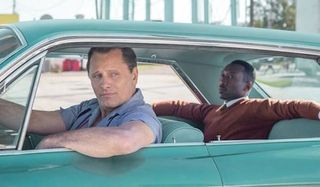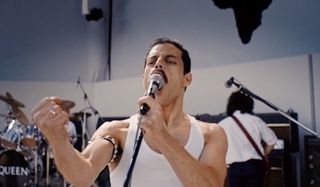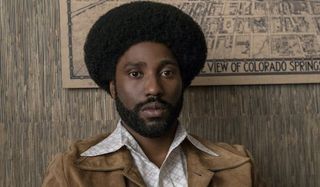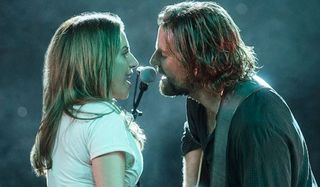It Was A Good Night For Safe Crowd Pleasers At The Golden Globes

This year's Golden Globe movie nominations were set to celebrate some of the most unconventional awards titles in quite some time. However, when it came time for the winners of Best Picture in the Comedy and Drama categories to be announced toward the end of Sunday night's show, some of the safest titles on the list took home the highest accolades.
Green Book led last night's wins as it nabbed Best Film Screenplay, Mahershala Ali was recognized for Best Supporting Actor and toward the end of the night, the movie took home Best Picture for a Comedy or Musical. Bohemian Rhapsody took two awards: Rami Malek for Best Actor and the last and most distinctive Globe, Best Picture -- Drama.
Why? How? What happened to edgier picks like Black Panther or BlackKklansman? Where was the love for A Star Is Born? Let's break down the Best Picture winners of last night's Golden Globes and analyze why they don't quite stack up to the other films that were in the running last night.

Why Green Book and Bohemian Rhapsody Won
The Golden Globes' Best Picture winner on the Comedy side is about the relationship between an African-American classical pianist (Mahershala Ali) and his Italian-American driver (Viggo Mortenson) as they tour the Deep South through a string of his gigs. As the men take a journey through the tenseness of the racially-divided South, they start to gain empathy and understanding of each other about the different communities where they hail from.
Green Book has its strengths. The lead actor's performances are unmistakably good, and it checks the box of tackling the hot button issue of race (though on the surface level compared to other nominees). The film won the Audience Award at TIFF which other Best Picture winners such as 12 Years a Slave and The King's Speech were honored with before going on to be recognized for higher accolades.
Bohemian Rhapsody, meanwhile, is a music-infused hit that told the story of Queen's rise to stardom, captured Freddie Mercury's essence, and showcased the band's foot-stomping rock hits to give audiences a look in to what seeing them live might have been like. A lot of people saw Bohemian Rhapsody, as it made an incredible $743 million at the box office, proving that the fan base and interest for the band's story was there among the general public, which can't be said for other past winners.

Why It's Kind Of An Issue That These Movies Won
The winners of the two Best Picture categories for the Golden Globes were good movies, but were also typical movies recognized in award shows -- biopics. They also didn't gracefully depict their subject in a way that warranted their wins, in my opinion, or take risks within the genre as their fellow nominees might have in their own. They also won during a groundbreaking year which could have seen wins for genres not typically recognized.
CINEMABLEND NEWSLETTER
Your Daily Blend of Entertainment News
Green Book didn't display a particularly nuanced approached to its topic of race relations and offered a story moviegoers have undoubtedly been on before. I feel that it does a good enough job of exploring the characters in an entertaining and engaging way and is certainly a crowd-pleaser, but goes just where one would expect on its journey.
The film is based on a "true friendship" and is co-written by the son of Viggo Mortenson's character. However, the family of the Mahershala Ali character have recently spoken out about Green Book, calling it "full of lies." This doesn't help the film's credibility, and since it doesn't seem like the film made a complete effort to tell both sides of "race relations" story, this makes Green Book a bit of a problematic Best Picture winner at the Globes.
Turning to Bohemian Rhapsody, the way Freddie and the band's story was told was criticized by many to be victim to some uninspired paint-by-numbers storytelling. The film also didn't really carve in the time to fully explore Freddie Mercury's bisexuality and struggle with AIDS -- a fact that, according to social media reaction, upset members of the LGBT community.
One reason why this was primarily ignored seemed to be because the filmmakers wanted Bohemian Rhapsody to be more of a rock opera, crowd-pleaser then an all-out risk taker on a biopic that might have explored more aspects of Freddie Mercury's life. Whilst Rami Malek's transformation into the icon is unmistakably an achievement worth recognizing (and done so through his Best Actor win last night), celebrating the film itself above all the rest of 2018 doesn't exactly sit well, in my opinion.

Why The Other Nominees Deserved More Attention
The "biopic" may have long been the award-recognition go-to genre in the past, but the Globes this year had so much more to work with in the original, different, fresh-faced picks that maybe should have beat out the conventional selections that emerged victorious.
In the Golden Globes' Comedy category, Crazy Rich Asians for example deserved recognition for a few reasons: it revitalized the romantic comedy in a way that was freshly feminist and featured the first all Asian-American cast in over 25 years and juggled them effectively. The Favourite, meanwhile, showed period pieces could be fun and had some memorable performances from Olivia Colman, Emma Stone and Rachel Weisz as they swore, entertained and shocked audiences.
By no means did Mary Poppins Returns reinvent the wheel it was inspired by, but it pulled off a delightful old-timey musical with full-fledged original songs and dances. Vice had some amazing depictions of politicians who shook the early '00s, most notably through Christian Bale's remarkable transformation and Adam McKay's eye for comedy.
In the Drama category alone, three films were crafted by black filmmakers with a specific eye for the nuance of the position of race in America throughout history: Spike Lee, Barry Jenkins and Ryan Coogler came to play with BlackKklansman, If Beale Street Could Talk and Black Panther. A Star is Born crafted original songs that brought out a believable romance between Lady Gaga and Bradley Cooper's characters, highlighting the perils of fame, addiction and realistic love.
I believe these movies were all risky projects in their own right that challenged the typical films of today, moved forward their genre and/or told an eye-opening story in an accessible way. Why do award shows keep falling back on biopic crowd pleasers?

There Are Plenty Of Awards Shows Left
The Golden Globes certainly isn't the only award show in the mix, as it is second in distinction to the Oscars coming in February. The Globes can sometimes be a predictor of what will be favored by the Academy or at least boost attention for the names most celebrated last night. The Critics' Choice Film and TV Awards, Screen Actor Guild Awards, BAFTAs and Annie's are important award shows for the season before the Oscars that could also show a different hand about what movies of 2018 can be celebrated.
While "crowd pleasers" were the distinction the Globes most celebrated, could be completely flipped on its head in the next award show. There were quite a few groundbreaking crowd pleasers this year that could be recognized too out of the biopic genre -- such as Black Panther, A Star is Born and Crazy Rich Asians. There's plenty more films that not many people saw but could be elevated by their recognition as well. Why does "based on a true story" have to sway Bohemian Rhapsody and Green Book over some of 2018's most impressive offerings?
What do you think? Did the Golden Globes get it right with Green Book and Bohemian Rhapsody? Or should they have honored other films in their respective categories?

Sarah El-Mahmoud has been with CinemaBlend since 2018 after graduating from Cal State Fullerton with a degree in Journalism. In college, she was the Managing Editor of the award-winning college paper, The Daily Titan, where she specialized in writing/editing long-form features, profiles and arts & entertainment coverage, including her first run-in with movie reporting, with a phone interview with Guillermo del Toro for Best Picture winner, The Shape of Water. Now she's into covering YA television and movies, and plenty of horror. Word webslinger. All her writing should be read in Sarah Connor’s Terminator 2 voice over.
Most Popular






